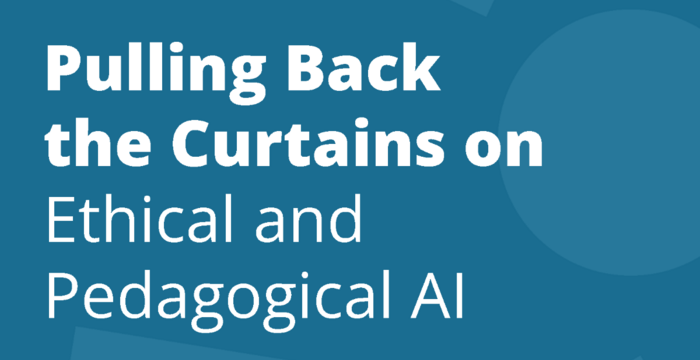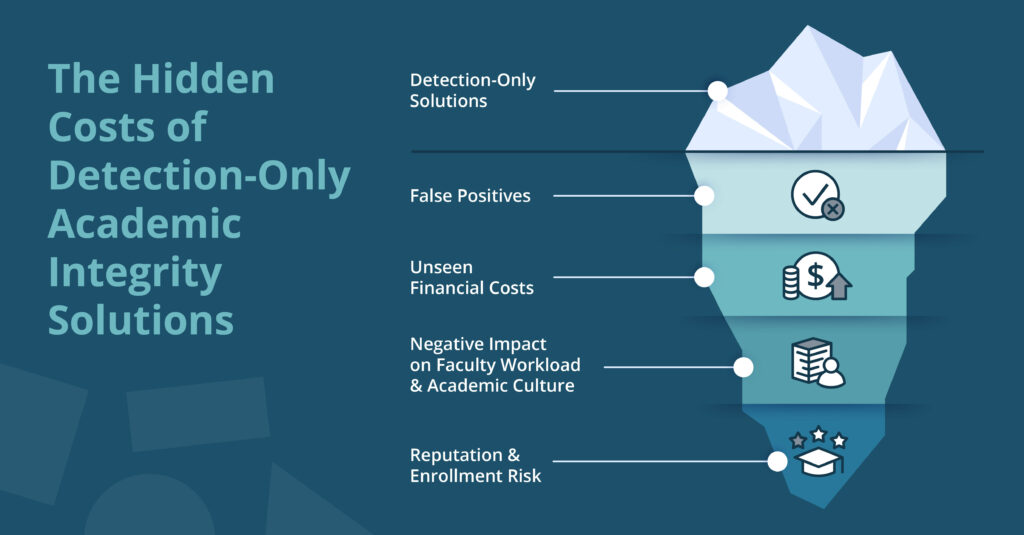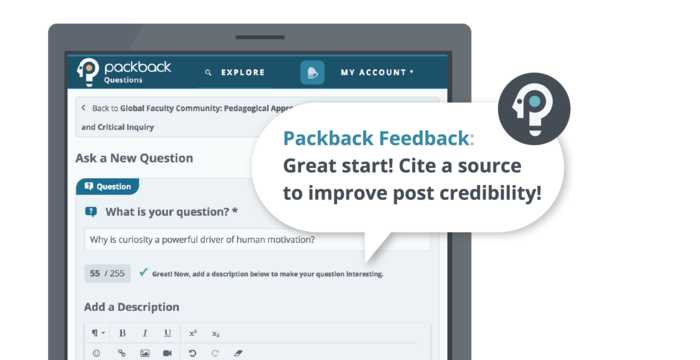Case Study: Inside the Institutions Where Writing and Critical Thinking Are on the Rise
Evaluation of student work in higher education remains a cornerstone of academic progress tracking and skill development. Grades serve as a crucial metric for assessing student understanding, providing feedback, and guiding instructional strategies. However, as we prepare the next generation of practitioners and academics in our respective fields, the complexities of modern education in today’s economy demand an approach to evaluation that balances authentic assessment with measurable outcomes aligned to course objectives.
Authentic evaluation practices can:
– Provide meaningful feedback to students on their progress
– Help instructors identify areas for improvement in curriculum and teaching methods
– Ensure accountability and maintain academic standards
– Prepare students for future professional environments
Authentic evaluation of student progress, then, necessitates much more time and elaborate feedback to improve student writing and discourse skill sets than educators have the ability to give. If assessment strategies not only measure but also prioritize and encourage critical thinking, application of knowledge, and higher-order cognitive skills, how can we support the underlying student needs that make the communication of content knowledge possible?
In response to these challenges, Packback provides this support with immediate feedback on writing processes, structure, and credibility of sources to help bridge any gaps that may exist between content knowledge and effective communication of that knowledge. I have noticed such an improvement in my students’ grades because of not only their ability to clearly demonstrate their content knowledge, but an overall excitement at what that clarity means for their ability to meaningfully collaborate with their peers and prepare themselves to be contributors within their discipline and cohort moving forward.
Here are some other professors on how integrating Packback has led to higher grades, student confidence, improved outcomes, and a more engaging educational experience for all involved.
Increasing Course Grades When Group Projects and Traditional Discussion Boards No Longer Work
Robin Ashley, Marketing and Business Professor, Eastern Carolina University
Introduction
Professor Robin Ashley, a faculty member at Eastern Carolina University, has dedicated her career to enhancing student success in her International Business and Marketing Management courses. Robin’s students’ grades weren’t meeting her expectations and she faced significant challenges trying to improve outcomes. Two years ago she sought out a solution to this problem, found Packback, and hasn’t looked back since.
Quantitative Results:
– 15% improvement in Marketing Management grades
– Full letter grade improvement in International Business grades
The Problem:
Before using Packback, Professor Ashley faced several issues impacting student outcomes. In one course, the traditional discussion boards were unmanageable with 80 students, leading to superficial responses and minimal academic growth. The grading process was time-consuming, and students were not fully grasping or applying course concepts. The course and her students were stuck in a rut.
In another course with 85 students, group projects suffered from uneven workloads, resulting in conflicts and inconsistent performance. Students who struggled with core concepts and basic writing skills produced subpar work, resulting in poor grades and uneven performance across the groups.
The Solution:
First, Robin integrated Packback’s discussion tool into her Cultural Environment of International Business course to create a more structured and impactful social learning environment where students were held accountable to more rigorous work. Packback required students to produce detailed responses in their discussions, ensuring they engaged more deeply with the material.
Robin also utilized Deep Dives for summaries & other longer-form writing assessments, which provided Robin with more effective and eicient grading methods. Robin let Packback take on red-pen grading while she spent her time giving students feedback on their content mastery.
Following the success in her International Business class, Robin implemented Packback in her Marketing Management class. Instead of an emphasis on group projects, Packback allowed her to individualize her assignments and projects. What was once a semester long group project was now broken into individualized Deep Dives assignments and periodic check-ins on Packback Questions. This more personalized approach helped students understand and apply course concepts in their work, and the ongoing feedback helped scale improvement and outcomes.
Students were no longer able to take a back seat in a group project, they had to rely on themselves to succeed.
The Results:
Robin’s results were significant and measurable. In her International Business class, students’ grades improved by a full letter grade. On Questions, students engaged more deeply with the material through weekly formative writing practice. With Deep Dives, the platform allowed Robin to provide timely, targeted feedback, which enhanced students’ understanding and performance.
In the Marketing Management class, the shift to individualized projects facilitated by Packback led to notable improvements in student outcomes. The continuous application of concepts in discussion posts resulted in higher-quality final projects, with students demonstrating a better grasp of the material that translated over to longer in-depth writing assignments in Deep Dives. Robin observed a remarkable 15% increase in course grades, directly attributed to the consistent practice and feedback mechanisms provided by Packback.
Students also reported that Packback helped them perform better than in previous courses. They appreciated the feedback on their writing and the opportunity to apply what they learned in a structured, supportive environment. The improvements in grammar, sentence structure, and comprehensive application of concepts were evident in their work, leading to higher grades and better overall performance.
To a professor who is interested in Packback but undecided, Robin would say: “Packback is an extremely valuable tool to get students to interact with each other and the content and topics you are teaching. Students will communicate with each other in the digital format much more than they would in a classroom setting, which is re/ected in their end grades. They’re able to discuss things that normally would not get talked about in a classroom and they become better students because of it.”
Low Assignment Completion Rates and Low Quality Work When Submitted? Tackling the Two-Headed Beast with Packback
Pamela Lizardi, Victimology Professor, Pima Community College
Introduction
Pam Lizardi, a longtime professor at Pima Community College, has been at the forefront of integrating innovative educational tools into her curriculum. In fact, back in 2017 she became one of the first community college professors to incorporate Packback into her courses. Her primary goal was to improve student performance and learning outcomes in her Victimology classes, but that has since expanded to include other courses.
Before adopting Packback, Professor Lizardi was deeply unsatisfied with the state of online discussion. Participation was minimal, with only 2-3 students consistently contributing, resulting in a lack of diverse perspectives and dynamic dialogues. When students did participate, they often provided superficial answers and showed limited engagement with the course material, which led to poor academic performance and overall low course grades. The disparity in student achievement was concerning, as many students struggled to grasp core concepts and articulate their understanding effectively. Pam needed a solution to enhance the quality and depth of engagement and ultimately increase the levels of academic achievement.
Quantitative Results:
– 17% increase in online discussion grades
– 60% increase in student participation
– 60% of students improved their ability to cite sources
The Solution:
During the first year that Pam integrated Packback, she conducted a comparative study between two of her Victimology courses. One class used the traditional LMS discussion board, while the other used Packback, with all other assignments and structures remaining identical. The differences were striking. Packback facilitated more detailed and thoughtful responses compared to the LMS discussion, with Packback students writing paragraphs instead of one- or two-word answers, demonstrating the deep understanding of the material that Pam had been looking for.
Observing the success, Pam extended Packback’s use by incorporating Deep Dives into her courses. These assignments required students to cite three academic sources, which enhanced their research and writing skills. Deep Dives provided a structured way for students to engage with AI-assisted technology responsibly, the AI feedback ensuring students substantiated their claims with credible academic resources, and never writing for the student.
The Results:
The impact of Packback on Professor Lizardi’s courses was substantial. Pam noticed a major improvement in the quality of research. Students began citing higher-quality sources more often, which improved the overall academic rigor of their work. Not only did the rigor of writing practice improve, but student participation in online discussions increased by roughly 60%. The result? In Victimology, student grades improved by 17% compared to the non-Packback class.
Pam also noted that over 50% of her students improved their ability to cite and quote sources accurately, thanks to the consistent practice provided by Deep Dives. The structured feedback and requirements Pam set for credible research helped students develop essential academic skills that were reflected in their improved grades and overall performance.
Students reported that Packback helped them think about various approaches to the subject matter, enhancing their critical thinking skills.
To other professors considering Packback, Pam advocates its use by highlighting the significant improvements in student outcomes and the efficient, supportive grading process it offers. She believes that Packback provides a powerful tool to facilitate deeper knowledge transfer and improve academic success.
A Vicious Cycle: When the Burden of Trying to Improve Student Writing Skill Prevents You from Improving Writing Skills
Michael Barton, University of Alabama, Criminal Justice Professor
Introduction
Michael Barton, a criminal justice professor at the University of Alabama, has long wanted to find a way to improve his students’ writing and critical thinking skills. He found that students often struggled with simple grammar and basic paper structure which led to a frustrating and long grading process, and even deterred him from assigning written assignments. However, over the past year, he has turned to Packback to provide him with a solution and began integrating Packback into his curriculum for several courses.
Quantitative Results:
– 5%-10% Improvement in writing assignment grades
– 84% of students reported that they felt Packback improved their writing skills
– 20% reduction in grading time
The Problem:
Before adopting Packback, Professor Barton faced significant challenges with student writing quality. The average grades on long-form writing assignments were consistently hovering around 75-80%, which is when Michael knew he needed to make a change. When Michael transferred from Louisiana State University to the University of Alabama he figured it was the perfect opportunity to try something new to solve this problem.
The Solution:
Michael incorporated Packback Questions and Deep Dives into his undergraduate courses to foster better engagement and improve writing quality. He immediately saw an improvement in the quality of in- class discussion and students ability to write accurately and succinctly. To help guide students in developing their unique points of view, Michael started to use the “featured post” function to showcase some of the more unique discussions on Packback Questions. As a result of Michael’s engagement, students began referencing some of the topics they saw on Packback Questions during in-class discussions.
For his graduate course, he implemented Deep Dives to provide the necessary structure for the course’s writing-intensive assignments. Deep Dives allowed students to receive feedback on their writing before final submission, refining their ideas and correcting errors in real time. He immediately noticed that students were submitting more well thought out and meaningful writing assignments which eased the grading process for Michael. Students became much more effective communicators and it created a better course experience for all parties.
The Results:
The impact of Packback was immediate and significant. Student grades on writing assignments improved by 5-10%, positively affecting overall course performance. Students communicated more effectively in both written assignments and classroom discussions. Michael’s teaching evaluations improved as students appreciated the support and structure provided by Packback. Additionally, grading became less frustrating and more eicient, allowing Michael to focus on delivering personalized, positive feedback on students’ understanding of concepts and their original ideas, rather than uninspiring red-pen feedback.
One graduate student reported significant improvement in her writing skills due to Deep Dives, leading her to purchasing her own subscription to Packback’s newest product, Writing Lab, so she could continue her progress after Michael’s course. Overall, Packback transformed Professor Barton’s teaching approach, leading to better student outcomes and a more positive classroom experience.
To a professor who is undecided on whether they want to try Packback or not, Michael would say give it a chance. When his class was at a crossroads he turned to Packback and it reinvigorated not only the class, but Michael too. Packback helped him and his class find joy in writing and has helped set his students up for success in the future.
Conclusion
Across various courses and institutions, Packback has proven to be a transformative tool for improving student grades and overall academic outcomes. In results consistent with our IRB sponsored whitepaper claiming that Packback can help increase student performance and engagement, upon integrating Packback into their courses, Professors Robin Ashley, Pam Lizardi, and Michael Barton each experienced monumental improvements in their students’ performance, and thus, positively impacted their own fulfillment. By facilitating deeper, more meaningful interactions with course material and providing structured, continuous feedback, Packback enables students to achieve higher levels of academic success and produce better grade outcomes.
For any educator looking to improve student outcomes and classroom performance, Packback offers a proven solution that can make a profound difference.




